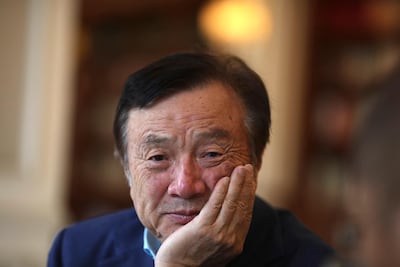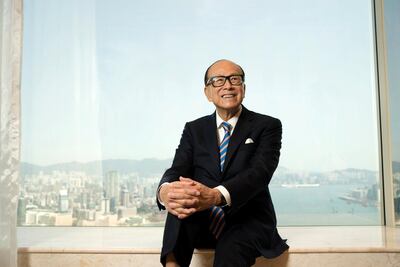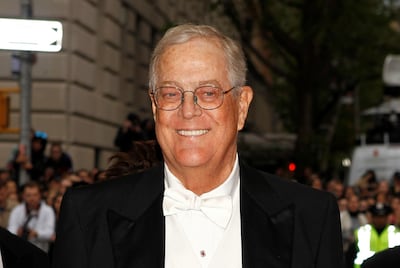Jane Lauder
Cosmetics heir Jane Lauder vaulted into the ranks of the world’s 500 richest people last week after shares of the cosmetics giant that bears her name surged on strong quarterly earnings and a rosy outlook for the fiscal year.
Ms Lauder’s net worth rose $1.5 billion (Dh5.5bn) this year, including a $447 million gain last Monday, bringing her fortune to $4.3bn, according to the Bloomberg Billionaires Index. She is ranked 461 on the list, just behind New England Patriots owner Robert Kraft.
Estee Lauder and its competitors are having a strong year thanks in large part to sales growth in Asia, and that’s fattening the coffers of the biggest names in the cosmetics business. Francoise Bettencourt Meyers, the richest woman on Earth, added $6.6bn to her fortune this year as shares of L’Oreal, the world’s largest cosmetics maker, climbed 18 per cent through Monday.
Ms Lauder, a member of the company’s board and a granddaughter of its namesake founder, is one of 69 women on the Bloomberg wealth ranking.
Shares of Estee Lauder advanced to a record Monday and the most since 2011 after posting fiscal fourth-quarter sales of $3.59bn and earnings per share that topped Wall Street estimates. Sales in Asia surged 25 per cent, led by growth in China, Hong Kong and emerging markets in Southeast Asia.
Ms Lauder, who’s married to Kevin Warsh, a former member of the Federal Reserve’s Open Market Committee, began working at the company in 1996. She joined the board in 2009 and became global brand president of Clinique in 2014.
Her uncle Leonard Lauder is the world's 41st-richest person with a $21.9bn fortune, up $6.8bn this year. A sister, Aerin Lauder, is also a billionaire, though her net worth is below the ranking's current $4bn cut-off.
The Lauders are the 23rd-richest family, according to Bloomberg’s family list.
Ren Zhengfei
Huawei’s founder Ren Zhengfei warned in an internal memo the company is at a “live or die moment” and advised underutilised employees to form “commando squads” to explore new projects. Workers who fail will have their salaries cut every few months and may lose their jobs, the billionaire said last week.
Since May, Huawei has occupied the uncomfortable position of being both an established global technology brand and a member of the United States Entity List, which bars it from trading with American suppliers. Despite a series of 90-day reprieves, the latest of which came last Monday, the uncertainty caused by American sanctions has already cost the company a great deal. Even if Huawei is eventually brought in from the cold, the impact of this summer's upheaval will be widespread and painful.
The most immediate of Huawei’s losses is the international smartphone market. The company’s internal estimates show it expects to sell 60 million fewer phones in 2019 than it would have done without the US impositions.
The company has downsized its workforce in response to its new circumstances.
Mr Ren warned in his memo that staff need to find a way to make themselves useful.
“They either form a ‘commando squad’ to explore new projects - in which case they could be promoted to company commander if they do well,” he wrote. “Or they can find jobs in the internal market. If they fail to find a role, their salaries will be cut every three months.”
Mr Ren wrote that the company’s priorities are for employees to make “meritorious deeds” and for management “to promote outstanding employees as soon as possible and infuse new blood to our organisation”.
In explaining the fresh extension to Huawei’s reprieve from US sanctions, US commerce secretary Wilbur Ross said that some American telecoms are “dependent” on Huawei tech and need time to wean themselves off it. So while the Washington authorities are giving Huawei a little more breathing room, the company’s situation is still very much precarious, as its founder has indicated.
Li Ka-Shing
The richest man in Hong Kong urged a halt to the city’s protests “in the name of love”.
"Love freedom, love tolerance, love the rule of law," billionaire Li Ka-Shing said in advertisements placed on the front pages of several local newspapers earlier this month, signing them as "a Hong Kong citizen".
“Love China, love Hong Kong, love yourself. The best cause can lead to the worst result. Stop anger in the name of love,” he said.
The message from the 91-year-old, called Superman by his admirers, was the latest in a slew of appeals for calm from the city’s tycoons as clashes between police and protesters grew increasingly violent. But unlike some of his peers, Mr Li stopped short of spelling out his support for the Hong Kong government and leader Carrie Lam, who is facing calls from protesters to resign.
Demonstrations that started in early June over a controversial bill easing extraditions to China have morphed into a wider movement against Beijing’s tightening grip over the city.
A spokesman for Mr Li said in a separate statement that the businessman believes Hong Kong’s long-term prosperity depends on the “one country, two systems” principle and that he wants residents to treasure that and stop the violence.
Mr Li embodies the rise of Chinese moguls in Hong Kong. A refugee to the city, he swept factory floors as a teenager and rose to the pinnacle of the city’s business leaders, heading a wide-ranging conglomerate that built skyscrapers, provided mobile-phone services and controlled ports across the globe.
With a net worth of $27bn, he retired as head of CK Hutchison Holdings and CK Asset Holdings in May 2018, handing over the reins to his eldest son Victor Li.
David Koch
David Koch, an American billionaire donor to Republican causes, died at age 79 after a long battle with cancer.
Koch retired last year as executive vice president of Koch Industries, the conglomerate he co-owned with Charles, his older brother, and built into the second largest family-owned company in the United States.
"We wish for all to celebrate the life and impact of this most generous and kind man," Charles Koch said in a statement Friday. "He believed he had a responsibility to a world that had given him so many opportunities to succeed."
Both brothers were a force behind the scenes in Republican politics, giving heavily to candidates and causes that matched their conservative economic positions. They were also recognised in 2015 for bipartisan work on prison reform in the United States.
Unlike his brother, though, David was socially liberal - a supporter of abortion rights and same-sex marriage as well as a non-interventionist foreign policy.
David ran as the Libertarian Party’s vice presidential candidate in 1980, but later broke with it and joined forces with the Republicans.
He was diagnosed with advanced prostate cancer 27 years ago but through "a combination of brilliant doctors, state-of-the-art medications and his own stubbornness kept the cancer at bay", Charles said.
Born in Kansas, David studied chemical engineering at the Massachusetts Institute of Technology before joining Koch Industries.
Forbes estimated his wealth at the end of his life at $42.4bn, making him one of the world's richest people.




